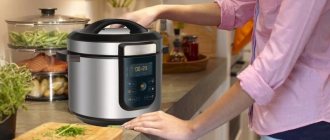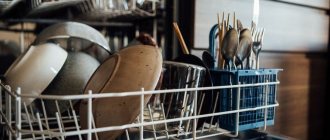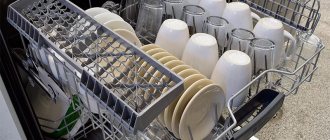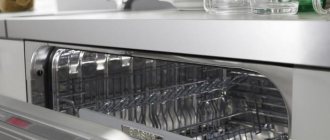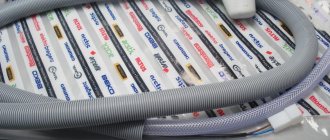When a dishwasher first appeared in my apartment, I thought - here it is, a lifesaver that will now clean the kitchen for me!
I think your first impression was about the same. And, like me, it was most likely followed by slight disappointment: a dishwasher is not a magical solution to all problems, it is just a tool. Which, like any other tool, has its limits and limitations. [/td]
| Would you like a GIFT from me personally? Enter your email and I'll send you a free recipe book! |
Washing dishes has become faster, but loading and unloading the dishwasher still takes a lot of time. It is demanding on water quality. If it breaks, it is usually at the most inopportune moment. And the worst thing is that not all dishes can be washed in it!
You probably read in the instructions before using it for the first time about what types of dishes should never be put in the dishwasher, and you’ve probably already forgotten half of them. For this reason, I decided to translate an article I discovered on my favorite English-language website about what types of dishes should not be washed in the dishwasher. This article was written by Daniel Gritzer, a man with a thorough approach and good theoretical background, so you can rely on him. And don't be alarmed by how long this list is. After studying it, you can rest assured: all other dishes can be washed in the dishwasher!
So, here's what you can't put in the dishwasher:
Knives and all cutting devices
Examples:
- any kitchen knives;
- graters;
- food processor knives;
- mixer knives;
- mandolins and hand slicers.
Causes:
There are several reasons why cutting devices should not be washed in the dishwasher. The first of them is safety. If you or someone else carelessly disassembles the dishwasher, you risk cutting yourself by tripping on the knife or picking it up at the wrong end. In addition, detergents have a bad effect on the knives themselves, dulling them even faster, which is especially important for amateur cooks who neglect the good habit of regularly sharpening their knives.
Similarly, the handles of knives may suffer, and the metal from which they are made may become rusty. Finally, knives can also damage your dishwasher - for example, cutting the rubberized inserts, which will lead to rust.
Metal objects
In order to preserve the dishes or their elements and not damage the surface structure, it is necessary to determine the correct processing method. Dishes made from materials that can be cleaned at low temperatures or that require gentle cleaning without the use of strong detergents are not suitable for automatic washing.
Aluminum cookware or items made from this metal are also not suitable for the dishwasher. During automatic processing, metal oxidation occurs. This is due not only to washing under high temperature, but also to the influence of the alkali contained in the detergent.
Aluminum cookware
Silverware will tarnish in the dishwasher and leave dark spots on the surface. It is generally best to wash silver items immediately after use: prolonged contact with products containing acid or oil should be avoided. It is also necessary to wash such dishes separately from other metal elements of utensils.
This rule also applies to cupronickel - under the influence of high washing temperatures, the coating will peel off.
Excess moisture in the dishwasher will cause rust on cast iron kitchen utensils if the surface of the product is not enameled or non-stick.
Cast-iron pan
Utensils made of any metal (except stainless steel)
Examples:
- cast iron cookware;
- carbon steel frying pans;
- non-stick frying pans;
- utensils made of enameled cast iron;
- copper frying pans, pots and other utensils;
- aluminum cookware, baking trays and other utensils.
Causes:
By and large, you should keep any metal other than stainless steel away from your dishwasher (and even that is susceptible to corrosion in certain cases). A cast iron or carbon steel pan will instantly lose the protective film of oil you've spent so much time creating and will begin to rust or at least lose its non-stick properties. Cookware made of enameled cast iron seems to be protected, but it may chip and its edges may also be damaged.
Aluminum will not rust, but will most likely lose its cheerful shine - since this metal enters into chemical reactions very readily, it is covered with an oxide film, which will quickly disappear under the influence of detergents. Utensils made of copper or brass will also lose their presentation. As for non-stick frying pans, they basically don’t require much cleaning, you just need to wipe them down (and if that’s not the case, then it’s time to replace your frying pan).
What materials should not be put in the dishwasher?
Since detergents for machines are much more aggressive than for hand washing, and the water temperature reaches 90 degrees, porous, fragile or easily rusting objects should not be placed in the device.
Which pots should not be washed in the dishwasher:
- Salad bowls and tureens in the form of pans (made of fine porcelain or glass, majolica, using the Gzhel, Khokhloma, etc. techniques). Fragile materials quickly crack, become cloudy or lose their glaze due to vibrations and too hot water.
- Clay and ceramic baking pans, but without glaze - these materials intensively absorb detergent and are reluctant to release it during rinsing, so the dishes will be toxic at the end.
- Pans with Teflon, ceramic and other non-stick coatings without a special protective layer - after several washes, such pans will “peel off” to the aluminum or steel base and lose their key properties. Multicooker bowls fall into this category - they require manual care only.
- Aluminum - usually cleaning them in the dishwasher turns into a disaster for them. The detergent removes the protective film of oxides, and the metal reacts with water. The result is darkening and unsuitability for food purposes.
- Cast iron cauldrons and frying pans - these dishes are too heavy and easily damage the fasteners, but the main thing is that the material rusts from prolonged humidity, and in the dishwasher, the filling usually remains until the morning.
- Any with handles made of wood or plastic, not designed for strong heat.
We recommend: Proven methods for cleaning the oven from grease and carbon deposits
A special word about enamel cookware. If it is iron and has chips on it, it will rust in the dishwasher. If the enamel is old or cheap, it will quickly crack. But expensive, high-quality enamel over cast iron is one of the best solutions. It does not peel off and does not allow the metal to oxidize. The only limitation is weight. A small 2-liter saucepan can still be placed in a tray, but a 5-liter cauldron is not worth it.
Advice Even very good enamel will last longer if you do not torment it with too aggressive detergents. Therefore, cleaning in a PMM is acceptable, but not recommended.
Which pots can be washed in the dishwasher without restrictions:
- stainless steel;
- small cast iron with high-quality enamel;
- glass for baking and microwave (designed for high temperatures);
- modern (and usually expensive) pans have a protective layer on top of ceramic or non-stick coating, preferably steel rather than aluminum in the base.
Advice Information about whether the pan is allowed to be washed automatically must be on the bottom or in the instructions for the pan. Pay attention to the icons before purchasing.
Fragile glass and thin porcelain
Examples:
- fine porcelain;
- plates with gilding or hand painting;
- measuring cups with marked marks;
- plates with gilding or hand painting;
- milk or uranium glass;
- fragile crystal and glasses with thin stems.
Causes:
Any glass, crystal, porcelain or ceramic dishes that are dear to you should be kept out of the dishwasher. Otherwise, you risk breaking it, which could damage your dishwasher. Painting and gilding may fade if regularly washed in the dishwasher, and glass or crystal may become cloudy and discolored. Of course, this does not mean that washing such dishes in the dishwasher is completely contraindicated, just make sure that you carefully evaluate the pros and cons.
Learning the notation
As a rule, all notes regarding the care of plastic utensils are placed on the front side of the bottom of the container. Turn the product over and look for one of the following icons:
- Two shelves in the dishwasher, the lower one with two plates and a glass, and the upper one with several cups.
- Two plates of the same size placed side by side on a dishwasher rack.
- A small and a large plate, towards which dotted rays are directed from the top of the image.
- Several plates in the water, with drops directed at them from above.
If you find one of these symbols, it means that washing this item in PMM is allowed. If one of these symbols is crossed out, it means that washing in the dishwasher is contraindicated. If no permitting or prohibiting icons were found, you will have to focus on the material of the product, information about which should be available in any case.
Attention! Polystyrene and PVC, which are designated on the container as PS and PVC, respectively, are categorically not suitable for washing in PMM. When heated, these materials melt, releasing toxic substances.
But dishes made of polypropylene or polyethylene terephthalate, designated PP and PET, respectively, tolerate interaction well with the dishwasher.
All mechanisms
Examples:
- pasta machines;
- meat grinders;
- hand chalks;
- pepper and spice mills;
- pressure cooker lids.
Causes:
One day, the Tin Woodman was caught in the rain and froze in place as his limbs instantly became covered with rust. It's a long story and it has many morals: we only have heart, brains and courage if we believe in ourselves; never lie; There's no place like home—but all of that is pretty trivial compared to the big lesson in this story: If you want your mechanical gizmos to keep working, don't put them in the dishwasher.
If it has gears, moving parts, handles or valves, wash it by hand according to the manufacturer's instructions.
Washing pans
It is forbidden to wash thin-walled aluminum pans, as well as tin and copper pans in the PMM. Teflon-coated cookware is exposed to aggressive cleaning agents and hot water, causing it to deteriorate.
It is allowed to wash frying pans with a stone coating and grill pans with a titanium top layer.
Made of cast iron
A cast iron frying pan can only be placed in a PMM if it has a ceramic or enamel protective coating.
Read more ► How to use a dishwasher: first start, loading rules, program selection, instructions
Despite the fact that cast iron is a reliable and durable material, products made from it are subject to corrosion under prolonged exposure to moisture and reagents. High temperatures in the dishwasher chamber also have a detrimental effect on the material.
It is important to know! In general, dishes made of this metal require special care, namely: hand washing, followed by drying and oiling.
Some plastic devices
Examples:
- plastic cutting boards;
- plastic containers for storing food.
Causes:
Lately, we are increasingly hearing that plastic is more dangerous than is commonly thought, especially when it comes to children’s health. In particular, they say that constant washing in the dishwasher or heating in the microwave leads to its gradual destruction.
This has not yet been fully proven, and many believe that these are unsubstantiated claims of paranoids. But in the absence of clear evidence, it might be worth considering whether you should reduce the amount of plastic in your dishwasher. After all, there are many other materials that storage containers are made from - glass, metal, and so on. On a more practical level, some plastic items can be damaged by hot water in the dishwasher.
Plastic and wood
Not all plastic products are dishwasher safe. Disposable tableware and plastic containers may become deformed or change color. What can be washed are products made from heat-resistant plastic. Any shape made from this material is also suitable.
Cutting boards and other wooden kitchen utensils are not recommended for use in the dishwasher. Under prolonged exposure to moisture and thermal drying, the structure of the wood is destroyed. After automatic processing, you can see wood delamination or cracks. To ensure long-term use, it is better to wash wooden utensils in warm water by hand.
An exception may be the use of a special water-repellent coating on wood products.
Wooden boards
Cookware with a hollow handle or thermal insulation
Examples:
- corollas;
- silver plate;
- some pots;
- old-fashioned ice cream scoops;
- thermoses, travel mugs and other thermally insulated utensils.
Causes:
The author claims that he was once almost killed by a stainless steel frying pan, which had a hollow metal handle inside. He regularly washed it in the dishwasher, after which one day it literally flew into the air while heating it on the stove. It turned out that during regular washing, water seeped inside the handle, and when too much of it accumulated there, it was torn from the inside.
This is, of course, a rare case, but it serves as a reminder: water can get into cavities that are not intended for it, and this is most likely to happen in a dishwasher. A whisk or thermos may not explode like a frying pan, but the water will still take its toll - kitchen utensils may rust, mold, or lose their insulating properties.
Basic set of utensils for the dishwasher
What can be washed in the dishwasher? The set of dishes that is suitable for the dishwasher includes:
- All items are made of stainless steel.
- Porcelain and earthenware plates and cups without decorative patterns.
- Glassware. In this case, to prevent beating during vibration, it is necessary to carefully place all objects at a short distance from each other.
- Silicone molds are ideally dishwasher safe. This material belongs to the category of heat-resistant, and any products in the form of brushes, spatulas, spoons are processed without damage. Whether lids with silicone rims can be washed depends on the material of the other components of the cookware.
Despite the standard limitations of automatic cleaning, some cookware manufacturers allow certain types of kitchen utensils to be machine processed. In this case, a gentle washing mode and low water temperature should be used. This feature will be indicated in the instructions or on the label.
Wild things
Examples:
- bras;
- salmon;
- engine spare parts;
- computer keyboards.
Causes:
There are people who quite seriously believe that these things belong in the dishwasher. And this is true, I myself have read about recipes for cooking salmon in sous vide using a dishwasher. There’s probably no need to explain why you shouldn’t do this.
I bet that many, after reading this list, were depressed: it turns out that most dishes cannot be washed in the dishwasher. However, after carefully studying this text, you will understand that some of the items listed in it, once in the dishwasher, will not harm either it or your health, and it is quite possible that the risk in this case is justified. And, of course, there is good, simply great news in all this: the vast majority of ordinary dishes and cutlery can be washed in the dishwasher! After all, that's what it was invented for. Thanks to the Serious Eats website, based on materials from which I wrote this article.
| 10 simple recipes for dinners in 15 minutes Enter your email and receive a recipe book - instantly and for free! |
Author: Alexey Onegin
Who is this?..
What can't be washed in the dishwasher
Plates, cutlery, and other kitchen utensils made from the following materials cannot be loaded into the PMM:
- bronze;
- brass;
- fine porcelain;
- copper;
- crystal;
- tin;
- carbon steel;
- aluminum;
- cast iron;
- silver;
- tree;
- milk, uranium glass;
- natural stone (granite, slate, marble).
PMM manufacturers warn that products not made from heat-resistant plastic should not be placed in the dishwasher. Disposable plastic plates, glasses, forks, spoons, and any items made of this material with glued elements are not intended for cleaning in an automatic dishwasher.
Kitchen utensils equipped with a vacuum lid (containers, thermal mugs), thermoses, sharp knives and any cutting objects are not washed in the machine.
Parts and mechanisms made of aluminum (individual parts of the meat grinder, garlic press), vegetable cutters and graters are washed only by hand.
Unglazed clay pots cannot be washed in the dishwasher because the material from which they are made is porous and absorbs foreign substances. For washing, capsules and tablets are used that contain potent chemical compounds and components.
Chemicals and water penetrate into the pores of the clay and subsequently become sources of a strong unpleasant odor that cannot be removed.
It is important to know! The non-stick coating of pans and pots is severely damaged in the unit, so they should not be loaded either.
Oven trays usually have a heavily soiled surface, so they cannot be placed in a washing machine, otherwise the appliance will become clogged with lard, grease, carbon deposits and food debris.
Read more ► Why the dishwasher does not wash dishes well: reasons, how to eliminate it when you need the help of a professional



